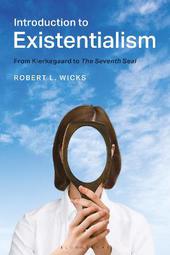
|
Introduction to Existentialism: From Kierkegaard to The Seventh Seal
Hardback
Main Details
| Title |
Introduction to Existentialism: From Kierkegaard to The Seventh Seal
|
| Authors and Contributors |
By (author) Professor Robert L. Wicks
|
| Physical Properties |
| Format:Hardback | | Pages:240 | | Dimensions(mm): Height 234,Width 156 |
|
| Category/Genre | Phenomenology and Existentialism |
|---|
| ISBN/Barcode |
9781441188939
|
| Classifications | Dewey:142.78 |
|---|
| Audience | | Tertiary Education (US: College) | |
|---|
|
Publishing Details |
| Publisher |
Bloomsbury Publishing Plc
|
| Imprint |
Bloomsbury Academic USA
|
| Publication Date |
19 September 2019 |
| Publication Country |
United States
|
Description
This textbook introduces you to existentialist philosophical theory and its cultural influence. The first part of the book offers an introductory overview of the 19th century historical roots of existentialist thought and chapters on all the key players: Kierkegaard, Nietzsche, Heidegger, Sartre, de Beauvoir, and Camus. The second part presents a thematic approach, with chapters on Christian and Jewish existentialism, existentialism in America, existential psychology and existentialism in the cinema. Ideal for undergraduate and classroom use, this engaging and accessible textbook includes pedagogical features, such as study questions, chapter summaries, key definitions and further reading.
Author Biography
Robert L. Wicks is Associate Professor of Philosophy at the University of Auckland, New Zealand.
ReviewsAmbitious in its sweep and patient in its survey of the major figures in the history of existentialism, this introduction is novel in its attempt to situate existentialism within the broader history of Western philosophy and offers careful and clearly written accounts of the major figures it examines. Wicks goes further than other commentators who have offered introductions and reader's guides to the subject in that he traces the formative influences on the pioneers of existentialist thought and reinforces these influences as he moves from figure to figure. Wicks further manages to include useful and informative accounts of the influence of existentialism on Christian and Jewish thinkers from the 20th century. At a time when existentialism is all too often seen as a dated and somewhat irrelevant philosophical approach, Wicks does a commendable job of making the case for its continuing relevance in the contemporary world while offering a helpful guide to readers looking to understand the fundamental ideas underlying some notoriously complex texts -- Dr Mahon O'Brien, Senior Lecturer in Philosophy, University of Sussex, UK
|